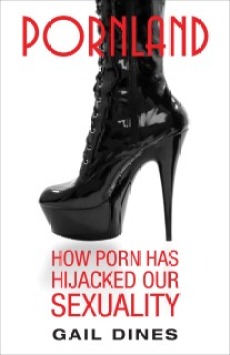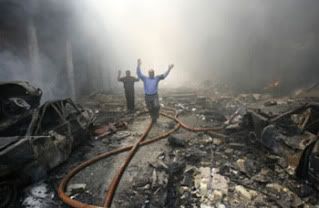This is an interview you may not be accustomed to viewing at Green Mountain Daily but I was encouraged to post it here. Pornography is an issue I don’t take lightly. As a father of two boys, I am concerned with how pornography conveys sex to today’s youth; how it exploits both women and men; and the fact that pornography is getting more and more graphic (and violent) than ever. Dr Gail Dines, of Wheelock College, puts pornography in some much-needed perspective and I hope this engages a lively, yet respectful, discussion. – Christian Avard
PS: I’m excited to say this interview got picked up by Andrew Sullivan, of The Atlantic, and Razib Khan of Discover Magazine : )
PPS: A section of the interview is today’s quote of the day at “The Economist” online. I don’t believe it!
Crossposted at P U L S E and XY online.


In today’s world, sex has become commodified and industrialized. We see it all the time in print publications, television commercials, cable television shows, major motion pictures, and adult entertainment. Pornography is a multi-billion dollar industry that misuses and abuses sex and represents it in disturbing ways. Pornographers sell and produce films based on teen sex, torture porn, humiliation, and/or racist caricatures. What’s more disturbing is that hard-core porn is becoming more mainstream in society.
Dr. Gail Dines is a professor of sociology and women’s studies at Wheelock College and an expert on pornography. Her new book, Pornland: How Porn Has Hijacked Our Sexuality, has just been released by Beacon Press and is considered a groundbreaking study of how today’s pornography shapes men and women’s ideas, attitudes, and perceptions of sex. Here is what Dines has to say about her new book and the effects of pornography.
Interview starts below the fold.
In the preface of your book, you share a personal story about a conversation you had with your son over pornography. You write, “I said [to him] that should he decide to use porn, that he was going to hand over his sexuality-a sexuality that he had yet to grow into, that made sense for who he was and who he was going to be-to someone else.” How and why do boys and young men give their power away to pornography? What kind of power does pornography have in shaping boys’ and men’s perceptions, attitudes, and beliefs toward sex?
Boys and men don’t realize the power they’re giving away to pornography. They don’t understand the power it has to shape who they are, their sexuality, and their sexual identity. In this culture, we think of pornography as a joke or something to laugh about. We don’t take it seriously as a source of information that has the ability and power to impact on the way we think about the world. Most boys and men go to pornography for an ejaculation; they come away with a lot more. I don’t think they’re quite aware of it.
Pornography, like all images, tells stories about the world. It tells stories about women, men, sexuality, and intimacy. In pornography, intimacy is something to be avoided, and-as I say in the book-“In pornography nobody makes love. They all make hate.” The man makes hate to the woman’s body. It’s about the destruction of intimacy.
Is it true that what most boys and men see in current trends of pornography are things that they expect in sex? How did that happen, and how is it impacting on boys’ and men’s perceptions, attitudes, and beliefs toward sex?
Well, a lot of people don’t know what pornography is. The first thing I do in the book is very purposefully describe it in detail. I know that for many people it’s going to be hard to read. I understand that. But if you’re really going to understand what I’m saying and why I’m saying it, then you have to understand the material I’m talking about. A lot of older men and women think I’m talking about Playboy from 15 years ago: a centerfold or a woman with no clothes on smiling in a cornfield. They think, “What’s wrong with that?” Well, that was bad enough in the way it objectified women, but we’re on a whole new level now with this kind of imagery.
How it got to this point is the Internet. It made it more accessible, affordable, and anonymous. You’re seeing a massive rise in use, and the users are getting younger and younger. Children who are 11½ years old are now looking at pornography because it comes straight into the home. There’s no limit on how much you can access. It used to be you had to steal father’s Playboy or Penthouse. Use was limited to how much you could actually pilfer. Today it is unlimited.
So what happens is that desensitization sets in that much quicker and that much earlier. In order to keep the consumer base going, the pornographers have to keep upping the ante. They make it more violent, body-punishing, or abusive as a way to keep men interested. When you think about it, if you’re exposed to it at age 11 or 12, you’re jaded by 20. You’re certainly jaded by 30. Pornography bleeds sex dry of intimacy, emotions, and connection. Once you do that, then there’s not much left. It becomes boring and mechanical. So you have to keep feeding newer and newer ideas just to keep [the audience] interested.
You describe Gonzo porn as “body-punishing sex.” Why is it body-punishing, why is it prevalent today, and what do people need to know about it?
It’s body-punishing because the male performers pound away at a woman’s body. You often see three men orally, vaginally, and anally penetrate her over and over again for 20 minutes or more, and these are often Viagra-fortified penises, so they stay hard much longer. A woman’s body has limits. All of ours do. What you see in Gonzo porn is a woman’s anus that is red and sore and a swollen vagina. All of these things happen because of the way a woman’s body is treated. Even the pornography industry says that Gonzo is very demanding and potentially dangerous for women. If the industry is saying it, then there’s certainly a problem.
What I’ve found with my interviews with men is the more they watch, the more they want porn sex, because they become habituated to that kind of industrial-strength sex. Once you become habituated to that, anything else looks boring or uninteresting. What I find is that some men lose interest in their partners altogether and use more pornography. Other men nag and cajole their girlfriends to perform porn sex, or they use prostitutes because that’s who they think they can play this porn sex out on.
Remember that you are not just reading or looking at porn. You’re actively masturbating and having an orgasm to it. It has a very visceral response in the body. This is one of the reasons it is so powerful.
How/why does pornography misuse and abuse the concepts of sex and how/why does pornography normalize the idea that pain is pleasure?
Well, it’s because of the way the woman’s body is treated. In pornography, no matter what you do to her, no matter how much you physically or verbally abuse this woman, she loves it. She can’t get enough. What I find fascinating and upsetting at the same time is…
Men believe that!
… That’s right. They believe it. I’ve had men argue with me that they believe women like it. So when I say to them, “What’s your evidence? Have you seen any empirical studies? Have you interviewed these women?” No, of course they haven’t. They’re using the text as their evidence because she’s saying “I love it! Give it to me harder!,” when of course she has no choice. First of all, she wants to get paid. She has to say that, and if she wants to continue working in pornography, she has no choice.
I often hear that women actively seek “body-punishing sex,” talk about liking it and desiring it, and write about it in non-pornographic, sex-related blogs, periodicals, and other forms of media. Sometimes I hear people say that degrading acts of sex can be intimate. Why is this perception wrong, and how has pornography made people think this way? Why is this an unhealthy perception of sex?
Because it distorts what women want, who they are, and the kind of sex they want to have. I don’t want to say there’s nobody who wants that kind of sex. In any society, you’re going to have variations on what people want.
The problem with pornography is that it normalizes that which is a minority preference for many women. That’s all you see in pornography. You never see anybody say, “Let’s hold, let’s kiss, let’s do all of these things.” Everyone in pornography wants it as hard and fast as possible.
So what they do is they normalize something very unusual in the culture. The more men look at pornography, the more they actually think that this is what women want, especially because they have no counterbalance to it. There is very little sex education today in this country outside of pornography that really speaks to boys and young men.
I’m sure you’ve heard the common response that “no one is forcing a gun on women to perform these acts, and they are doing it by choice.” Why is that a common justification for porn, and what is wrong with that argument?
I think that’s a very apolitical and de-contextualized understanding of choice. The majority of women in pornography-and it’s true in prostitution as well-are not women who have medical and law degrees, and they’re not choosing between practicing medicine or going into pornography. The women are usually working class women who are looking at minimum-wage jobs and who have been sold an image of pornography, that it’s glamorous. They see people like Jenna Jameson or Sasha Grey with all of their pop culture celebrity status.
Recently, Jameson was on Oprah Winfrey, and there was no real analysis of what happens to women in pornography. What they did is glamorize it by showing the wealth Jameson accumulated. What they don’t show is that for every Jameson there are tens of thousands of women who end up poor, drug-addicted, incur bodily problems and diseases. And often a lot of the women are there for only a short time. They have a very short shelf life, and many of them end up in brothels of Nevada. They don’t end up in a huge mansion with lots of fancy cars and beautiful clothes.
Another common attitude or belief boys and men have toward pornography is “Well, that’s just a fantasy and I wouldn’t act that out in real life.” Do you see that as an excuse to legitimize pornography? Why is that problematic?
I address this in my book. As progressive people, we cannot bear that the right-wing media has the power to construct ideology in this country. None of us who are progressive will look at Fox News and say, “It’s just imagery; it’s just a fantasy; and it has no effect.” People can tell the difference between media and reality. We know media has the power to shift views and consolidate right-wing ideology.
Pornography is also a form of media representation. So why is it that Fox News and Rush Limbaugh have the power to change and shape society, and suddenly pornography is the only media form that has no effect? This whole fantasy issue is totally ludicrous. It takes no account of how images construct reality.
While pornography is pushing the boundaries of sex, it’s also making its way into more and more mainstream media. What are the most prevalent examples of porn being accepted or seen as “normal,” and how is it being legitimized?
One example I talk about in Pornland is Brazilian waxes. They come straight down from the pornography industry. Most of the female students I meet across the country have no pubic hair whatsoever. Their boyfriends don’t like it, and I’ve even heard of cases where boys won’t have any sex with women if they have any hair. Where did this come from? When I was growing up, if somebody did that, you would think something was wrong with them. Suddenly girls are increasingly taking all of their pubic hair off and getting bikini waxes.
Another example is the way in which the pornographic and prostitution culture is being glamorized. Women can now take pole-dancing lessons. They wear clothing that looks like they just stepped out of pornography. You see it everywhere, and women are capitulating to men’s sexual demands because there are very few alternative ways of being female in this culture.
Another example of pornography having power is in the hook-up culture that’s taking place on college campuses. What is hook-up sex? It’s porn sex. It’s the same thing. It’s anonymous, non-intimate, and disconnected sex, and everyone is having hook-up sex in pornography. Increasingly, what’s interesting is that women and girls are consenting to hook-ups even though studies show that they experience less sexual pleasure than men and are more likely to be raped in such situations.
Pornography today is being mainstreamed by the likes of Howard Stern, “Maxim” magazine, or the “Girls Gone Wild” series. You also mention the series “Sex and the City” in your book. How does the show shape perceptions of pornography, especially for women?
In “Sex and the City,” pornography is kind of a minor character on the show. It pops up a few times with men masturbating to porn and wanting to bring it into the bedroom. These women on “Sex and the City” were not outraged. Some of them didn’t like it but rarely complained. A lot of men in “Sex and the City” wanted porn sex, hook-up sex, urination sex, and other things that come from pornography. What you saw in “Sex and the City” was women hooking up and then feeling empowered by it, when in reality what they really wanted-and what made “Sex and the City” such a conservative show-was to settle down with a guy. The series was all about finding Mr. Right.
In Pornland you discuss racism in pornography. Oftentimes I hear, “They’re not racist, they’re just funny titles.” How prevalent is racism in pornography, and is it being diminished or trivialized by consumers and producers alike? Why hasn’t most of society picked up on this element?
One in four new videos to hit the market is interracial, which is sex between a black man and a white woman. Today’s interracial videos depict body-punishing sex. A black man’s penis is referred to as “gigantic,” “huge,” and “monstrous,” and the images reduce black men to their penises, which has historical resonance in this culture. Black women are portrayed as extremely animalistic, uncontrollable, and deviant in their sexuality. Now what happens is when you show these images over and over, it reinforces the way white people think about people of color, because in this country one of the ways in which they have rendered invisible racist ideology is by sexualizing it.
Why haven’t many people picked up on this racist element in pornography?
I think most of them don’t know. When I tell people, they’re shocked. If you ask the men who use pornography, they’re not. But these men, once aroused and eager to find an image to masturbate to, are not in any mood to start doing a critical deconstruction of the text.
One of the main reasons why interracial porn is so popular with white men, which is the main consumer base, is if pornography is about the dehumanization of women, what better way to dehumanize a white woman in the eyes of white men than to see her being penetrated over and over by something they view as depraved, the black male body?
People or individuals who try to explain that sex is about intimacy, caring, sharing, and trust in a relationship are often cast off as “prudish,” “a tight-ass,” “a religious nut,” or “someone who isn’t getting any.” How difficult has it been to explain this aspect of sex and how pornography strips it of any human connection? Why is there such aversion to sex based on equality and respect?
I think there is a real fear of being labeled anti-sex. The way pornographers and their allies have sold this is that you’re either pro-pornography or you’re anti-sex. Which of course is ludicrous because pornography is not the same as sex. Pornography is an industrial product. It commodifies human needs and sells it back to people, often in an unrecognizable form. It is not simply a reflection of reality. It is a specific representation of it and it is a specific way of representing sex.
Now to assume that if you are against pornography you’re against sex, is to assume that anyone who criticizes McDonald’s is anti-eating. People who criticize McDonald’s are against the destruction of the environment, against the assault on healthy foods, and against child obesity. They are against an industrial product. They are not against eating. So why can’t they see that it is the same thing when it comes to pornography and sex?
Given the prevalence of pornography today, that demand for pornography is going up, not down, and that sex acts are getting more and more violent, degrading, and humiliating for men and women, are you hopeful that things can be turned around?
To turn this around there needs to be a massive public health awareness campaign. Unless people begin to understand the role pornography is playing in our culture, I can’t see any reason that this won’t get worse, because all of these men who started watching pornography young are going to want more and more. Pornographers themselves say they’re having trouble keeping up with what fans want because they want it so hardcore.
Where is this going to end? I don’t know. What will an 11-year-old boy want 10, 20, or 30 years from now? Nobody knows. The truth is we’ve never brought up a generation of males with hardcore pornography. No one can really say what’s going to happen. What we do know, from how images and media affect people, is that it’s going to increasingly shape the way men think about sex, sexuality, and relationships.

 I want to give a shout out to those who participated in a successful night of activism. Several activists leafleted 249 people attending last night’s Israeli Ballet performance at the Flynn Theater.
I want to give a shout out to those who participated in a successful night of activism. Several activists leafleted 249 people attending last night’s Israeli Ballet performance at the Flynn Theater.



